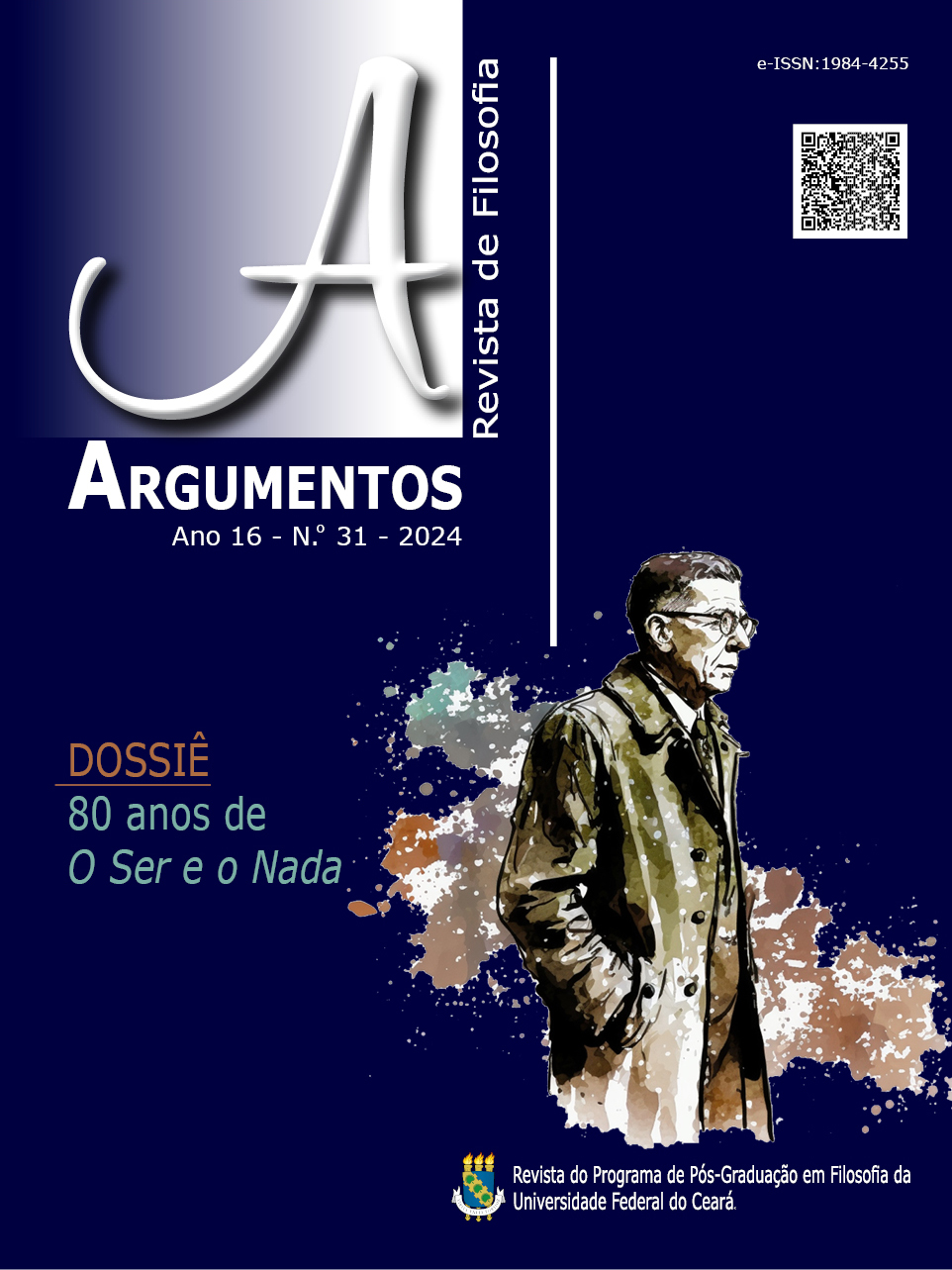The Extended Mind
DOI:
https://doi.org/10.36517/Argumentos.31.20Palavras-chave:
Mente estendida.Resumo
Onde acaba a mente e começa o mundo? A pergunta solicita duas respostas standard. Alguns aceitam as fronteiras da pele e do cérebro e dizem que o que se encontra fora do corpo está fora da mente. Outros ficam impressionados por argumentos sugerindo que o significado das nossas palavras “simplesmente não está na cabeça”, sustentando que este externismo a respeito do significado leva a um externismo sobre a mente. Propomo-nos seguir uma terceira posição. Defendemos um tipo de externismo muito diferente: um externismo ativo baseado no papel ativo do ambiente orientando processos cognitivos.
Downloads
Referências
BEER, R. Intelligence as Adaptive Behavior. New York: Academic Press, 1989.
BLAKE, A.; YUILLE, A. (Eds.). Active Vision. Cambridge: MIT Press, 1992.
BURGE, T. Individualism and the mental. Midwest Studies in Philosophy, n. 4, p. 73-122, 1979.
CHALMERS, D. J. The components of content. In: CHALMERS, D. J. (Ed.). Philosophy of Mind: Classical and Contemporary Readings. Oxford: Oxford University Press, 2002.
CLARK, A. Microcognition. Cambridge: MIT Press, 1989.
HAUGELAND, J. Mind embodied and embedded. In: HOUNG, Y.; HO, J. (Eds.). Mind and Cognition. Taipei: Academia Sinica, 1995.
HUTCHINS, E. Cognition in the Wild. Cambridge: MIT Press, 1995.
KIRSH, D. The intelligent use of space. Artificial Intelligence, n. 73, p. 31-68, 1995.
KIRSH, D.; MAGLIO, P. On distinguishing epistemic from pragmatic action. Cognitive Science, n. 18, p. 513-549, 1994.
McCLAMROCK, R. Existential Cognition. Chicago: University of Chicago Press, 1995.
McCLELLAND, J. L.; RUMELHART, D. E.; HINTON, G. E. The appeal of parallel distributed processing. In: McCLELLAND, J. L.; RUMELHART, D. E.; PDP Research Group. Parallel Distributed Processing. Vol. 2. Cambridge: MIT Press, 1986.
McHUGH, M. China Mountain Zhang. New York: Tom Doherty Associates, 1992.
PUTNAM, H. The meaning of “meaning”. In: GUNDERSON, K. (Ed.). Language, Mind and Knowledge. Minneapolis: University of Minnesota Press, 1975.
SIMON, H. The Sciences of the Artificial. Cambridge: MIT Press, 1981.
SUCHMAN, L. Plans and Situated Actions. Cambridge: Cambridge University Press, 1987.
THELEN, E.; SMITH, L. A Dynamic Systems Approach to the Development of Cognition and Action. Cambridge: MIT Press, 1994.
TRIANTAFYLLOU, M.; TRIANTAFYLLOU, G. An efficient swimming machine. Scientific American, v. 272, n. 3, p. 64-70, 1995.
ULLMAN, S.; RICHARDS, W. Image Understanding. Norwood: Ablex, 1984.
VARELA, F.; THOMPSON, E.; ROSCH, E. The Embodied Mind. Cambridge: MIT Press, 1991.
WILSON, R. Wide computationalism. Mind, n. 103, p. 351-372, 1994.
Downloads
Publicado
Edição
Seção
Licença
Copyright (c) 2024 Argumentos - Revista de Filosofia

Este trabalho está licenciado sob uma licença Creative Commons Attribution 4.0 International License.
Autores que publicam nesta revista concordam com os seguintes termos (SOBRE COPYRIGHT E POLÍTICA DE ACESSO LIVRE):
1. Autores mantém OS DIREITOS AUTORAIS concedidos à revista OU Direito de Primeira Publicação, com o trabalho simultaneamente licenciado à Atribuição de Licença Creative Commons (CC BY) que permite o compartilhamento dos trabalhos com reconhecimento de autoria e publicação inicial nesta revista.
2. Autores têm permissão para aceitar contratos, distribuição não-exclusiva da versão do trabalho publicada nesta revista (por exemplo: publicar no repositório institucional ou como um capítulo do livro), com reconhecimento de autoria e publicação inicial nesta revista.
3. Autores têm permissão e são estimulados a publicar e distribuir seu trabalho on-line (por exemplo: em repositórios institucionais ou em sua página pessoal) mesmo durante o processo editorial, haja visto que isso pode aumentar o impacto e citação do trabalho publicado.




.jpg)










._._3.png)
1.jpg)
._._._.png)
